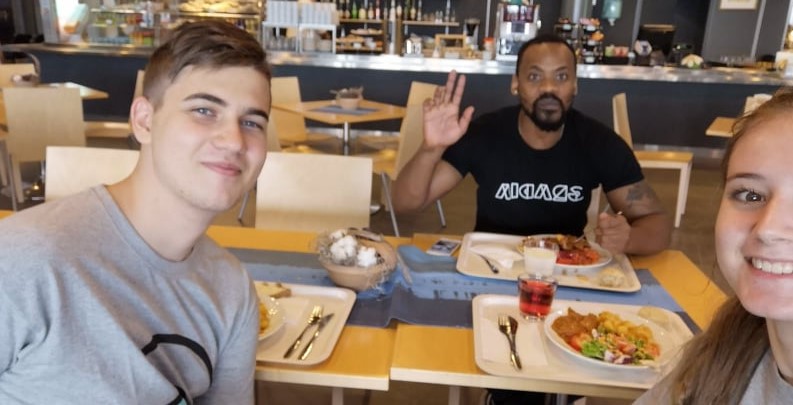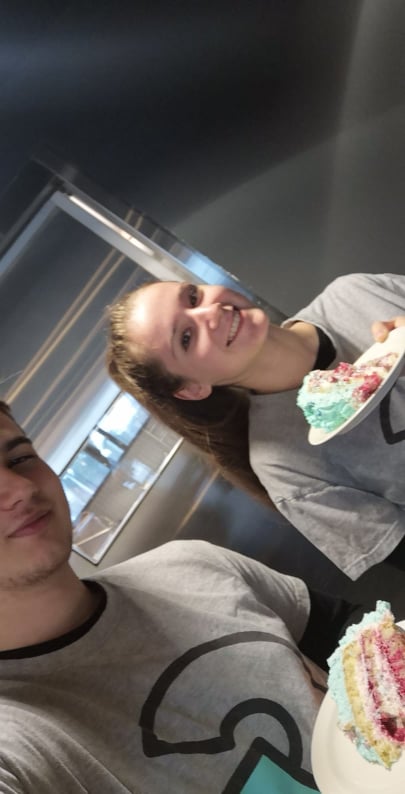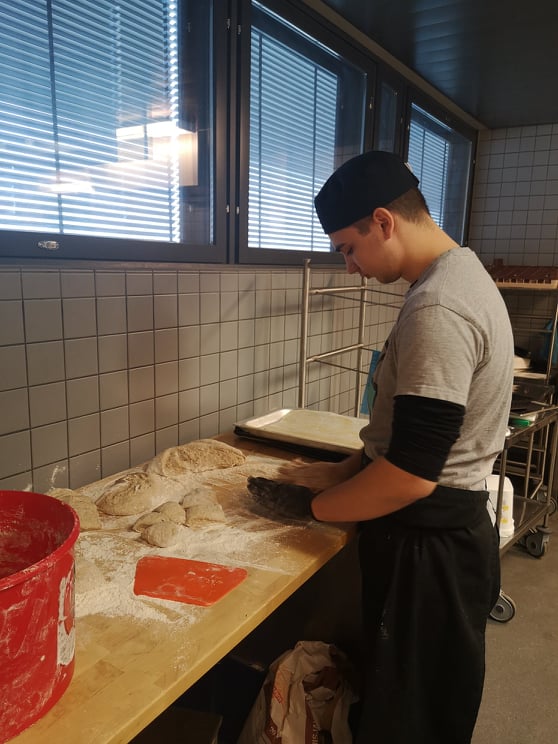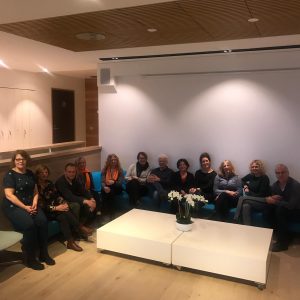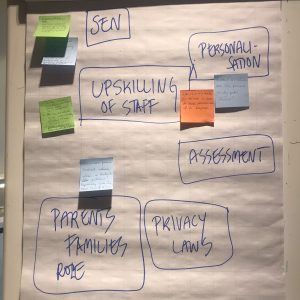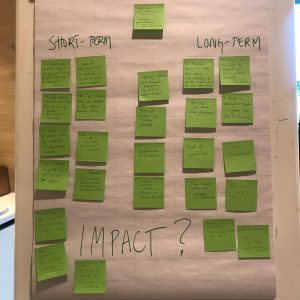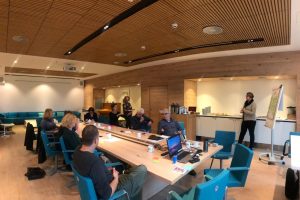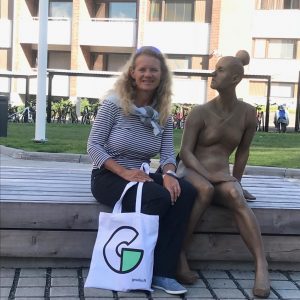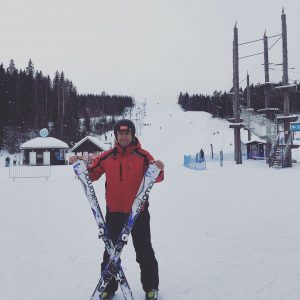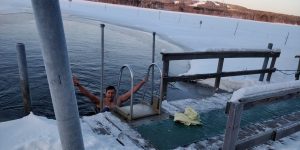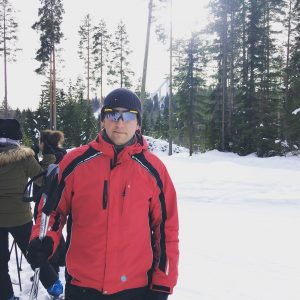Viileänä syyskuun tiistai-iltana saavuimme Saksaan Hallen kaupunkiin, joka on noin 130 km Berliinistä ja 30 km Leipzigistä etelään. Illan pimeydessä emme kaupungista juuri mitään nähneet ja väsymys oli matkaviivästysten jälkeen kova. Siksi hotellissa jokainen meistä oli valmis unten maille! Aamulla uteliaina aloitimme karttojen tutkimisen löytääksemme kokouspaikan. Selkeiden ohjeiden avulla ja kaupungin mutkittelevia teitä kävellessä tapaamispaikkamme, Felicitas-von-Selmenitz-Haus, löytyi vaivatta. Oli mukava tavata jo kolmatta kertaa kansainväliset kumppanimme Saksasta, Ruotsista ja Belgiasta.
Turvallisuusorientoitunut projektityöntekijämme Ulla oli tuonut Suomesta tuliaisiksi Gradia-heijastimia, joiden käyttötarkoitusta pääsimmekin heti aluksi selittämään.
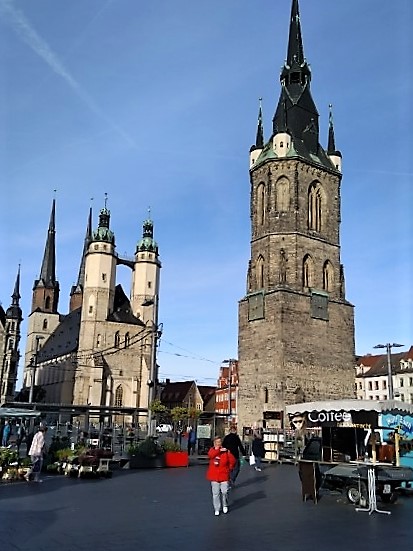
Lego-ukkoja ja kaavioita
Tervetulotoivotusten jälkeen saimme tehtäväksi esitellä oman kansallisen hankkeemme tilanteen tällä hetkellä. Esittelyä ei toteutettu valmisteltujen PowerPointien avulla, vaan meille annettiin erilaisia tarvikkeita ja 20 minuuttia aikaa luovan esityksen koostamiseen. Ja mitä kaikkea syntyikään! Lego-ukkelipöytä, kaaviokuva, julisteita ja meidän oma näytelmämme, jossa oli viisi lyhyttä näytöstä.
Näytelmämme vastasi seuraaviin kysymyksiin: millaisen matkan olemme hankkeessamme tähän saakka tehneet, missä olemme nyt, mitkä ovat pääkysymyksemme kansainväliselle ryhmälle, mitä tarvitsemme yhteistyöltä ja mitä itse voimme sille antaa.
Virkistävän ja varsin erilaisen aloituksen jälkeen tunnelma oli korkealla ja ohjelma saattoi jatkua. Tämänkertaisista kokousjärjestelyistä oli vastuussa LAMSA eli Saksi-Anhaltin osavaltion maahanmuuttajayhdistysten kattojärjestö. Järjestön toiminnanjohtaja Mamad Mohamed piti puheenvuoron, jossa hän esitteli järjestön toimintaa.
Lounaan jälkeen keskiviikon ohjelma jatkui Open Space -menetelmää hyödyntävällä ryhmätyöskentelyllä, jossa jokainen kumppani kertoi omien hankkeittensa ajankohtaisista asioista.
Mentorointitarinat ja kriittiset tekijät
Saksan matkaa varten olimme tehneet Maahanmuuttajien mentorointi toisella asteella -hankkeessa pienen julkaisun mentoreiden ja mentoroitavien tarinoista. Tarinavihkoset jaettiin kaikille kumppaneille ja koska aika loppui kesken, pyydettiin siihen kommentteja seuraavaan päivään mennessä.
Löytyisikö kertomuksista esimerkiksi belgialaisen HIVA:n (työn ja yhteiskunnan tutkimuksen monialainen tutkimuslaitos) kartoittamia mentoroinnin kriittisiä tekijöitä?
Torstain toiseen pitkään kokouspäivään hankkeemme edustajat valmistautuivat eri tavoin: konsertista tai pitkistä yöunista nauttien. Uusi kokouspäivä aloitettiin tutustumalla laatukriteereihin ja kriittisiin menestystekijöihin maahanmuuttajien työelämään mentoroinnissa.
Vaikka oma toimintamme tapahtuukin kouluympäristössä, pystyimme tunnistamaan tarkistuslistasta useita kohtia, jotka myös me koimme tärkeiksi maahanmuuttajien mentoroinnissa. Näitä olivat mm. mentoreiden valmennus tehtäväänsä, saatavilla oleva tuki molemmille osapuolille ja arvioinnin hyödyntämisen tärkeys mentorointiprosessin kehittämisessä.
Valmentamismalli maahanmuuttajille
Päivän toinen ja erittäin mielenkiintoinen käytännön esimerkki vähän koulutettujen maahanmuuttajien valmentamisesta mentoreiden avulla työelämään tuli Belgian Flanderista. Open Atelier -yhtiön Eric Aegden kertoi toiminnasta, jossa he tarjosivat metallialasta kiinnostuneille maahanmuuttajille ohjatun työskentelypaikan, jossa he voivat saada taitoja alalle.
Työskentelytapa ja haasteet kuulostivat kovasti tutuilta, sillä Gradiassa järjestetään maahanmuuttajille Ammatilliset perusteet -koulutuksia, joissa opiskellaan alan alkeita sekä kieltä samanaikaisesi.
Päivän aikana saimme myös palautetta mentorointitarinoistamme, kun yhteishankkeen koordinaattori Valerie Carrette ystävällisesti kopioi tarinat isoille papereille, joihin osallistujat kirjasivat tarinoista tekemiään havaintoja.
Saksalainen Intergrif-hanke oli kutsunut iltapäivän vetäjäksi Christian Hartwigin. Hänen johdollaan toteutimme temaattisen työpajan aiheesta, kuinka edistetään tiedonjakoa ja molemmin puolista oppimista maahanmuuttajien työmarkkinoille integroitumisessa.
Illalla ohjelma jatkui LAMSA:n 10-vuotisjuhlan merkeissä. MentoMigri (englanninkielinen nimi suomalaiselle hankkeellemme) esittäytyi ja kertoi Suomen maahanmuuttotilanteesta. Lisäksi kerroimme mentorointiprosessista, jota kehitämme ja jaoimme tuliaiseksi osallistujille tarinakokoelman mentorien ja mentoroitavien kokemuksista. Juhlassa oli myös muita asiantuntijapuheenvuoroja ja vapaata keskustelua. Oli mielenkiintoista saada kuulla Saksan tilanteesta enemmän ja verkostoitua.
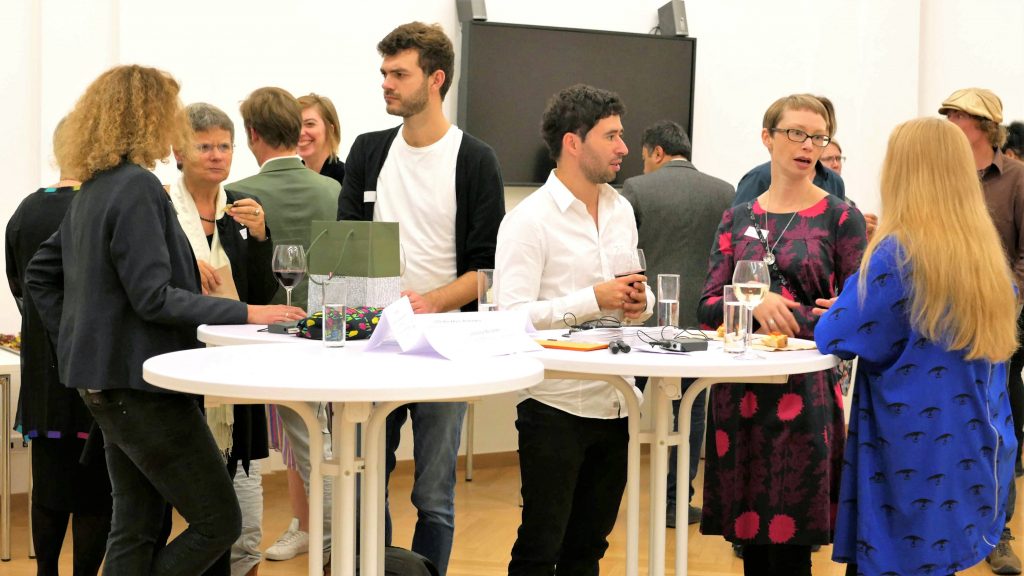
Tapaamisen anti
Matkamme viimeisenä päivänä meillä oli ohjausryhmän kokous. Siinä pohdimme tämänkertaisen tapaamisemme onnistumista. Jokainen osapuoli sai kertoa, mitä konkreettisia toiveita sillä on muille kumppaneille ja mitkä ovat sen lopulliset tuotokset.
Omat vastauksemme näihin olivat, että toivomme kovasti saavamme jonkin koulutusorganisaation testaamaan mallejamme ja haluamme vertailla erilaisia mentoreiden valmennussisältöjä. Tuotoksiamme tulevat olemaan maahanmuuttajien mentorointimalli, johon sisältyy mentoreiden valmennusmalli, sekä mentorointitarinat. Nämä tulevat osaksi yhteistä käsikirjaamme englanniksi.
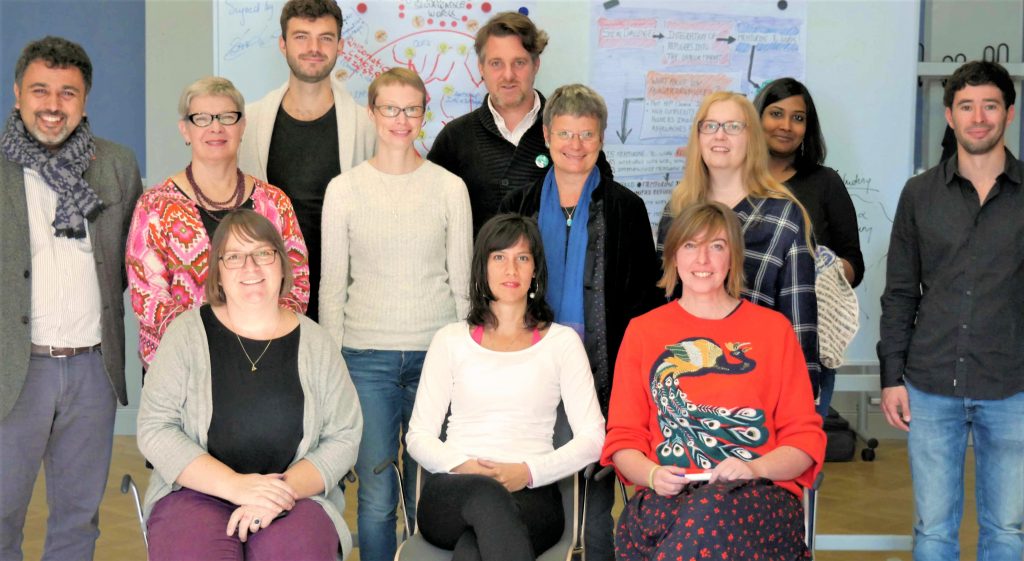
MeMoRe-yhteistyö
Jyväskylän koulutuskuntayhtymän Maahanmuuttajien mentorointi toisella asteella -hanke on mukana ensimmäisessä ESR-rahoitteisessa kansainvälisessä yhteishankkeessa nimeltään MeMoRe. Mukana on kansallisia hankkeita Suomen lisäksi Ruotsista, Belgiasta ja Saksasta. Yhteistyön kehyksenä on maahanmuuttajien mentorointi, jonka äärellä tavattiin syyskuun 2018 lopussa jo kolmatta kertaa.
Mentorointiterveisin,
Ulla Koukkari-Anttonen ja Aino Malin, Gradia
Johanna Moilanen, JAMK
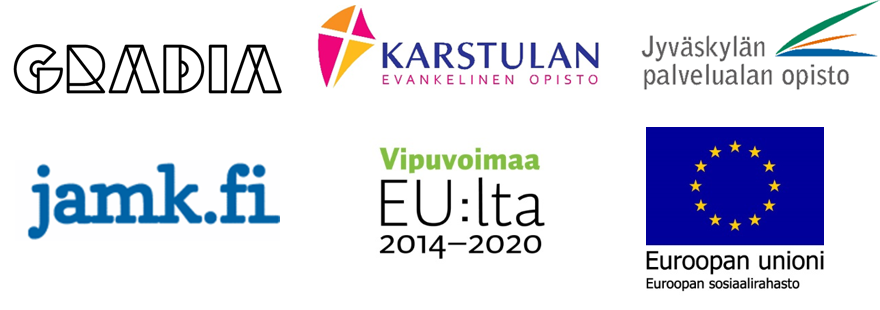
Maahanmuuttajien mentorointi toisella asteella -hanke (ESR) kehittää
maahanmuuttajien integroitumisen keinoja koulutuksessa. Tämä
toteutetaan valmentamalla toisen asteen opiskelijoista mentoreita
maahanmuuttajille. Samalla edistetään kantaväestön
monikulttuurisuustiedon ja -taitojen karttumista ja
kahdensuuntaista integraatiota.
Hankkeen toimenpiteenä luodaan ja pilotoidaan kahdesti
maahanmuuttajien mentorointimalli sekä mentoreiksi haluaville
valmennusmalli. Mallit jäävät osaksi kumppaneiden toimintaa.
Niitä levitetään yhdessä kansallisten ja kansainvälisten
kumppaneiden kanssa.
Osatoteuttajia ovat Jyväskylän ammattikorkeakoulu, Jyväskylän
palvelualan opisto sekä Karstulan Evankelinen Opisto.
Lisäarvoa saadaan kansainvälisestä yhteistyöstä (Belgian, Saksan ja
Ruotsin kanssa) tutkimuksen, kokemuksen, koulutuksen sekä
erilaisten mentorointimallien kokeilujen muodossa eri maista.
